- Home
- John Barth
Letters Page 16
Letters Read online
Page 16
You Pled Disqualification on the grounds of a Slight Prior Acquaintance, in college days, with Pocahontas’s ex-husband, the writer Ambrose Mensch.
“Do not Bother me with History,” the Doctor said. But troubled himself to inquire whether Pocahontas had been on the scene in those days.
“No. As a matter of fact, I Believe Mensch’s mistress back then was the Mack girl. The one we’re calling Bibi.”
“Incroyable. Both here at the same time. Do they know?”
So far as you Knew, you Reported, Marsha Mensch and Bea Golden (née Jeannine Mack of Maryland) were unacquainted with each other and with their historical nexus. You Did Not Bother to Add (the Doctor being uninterested on principle in case histories) that the middle-aged scholarly English gentlewoman who had been brought to the Farm from Toronto in 1967 by Monsieur Casteene to have a remobilizing operation under the nom de guerre of Lady Russex might also by this time be a friend of Ambrose Mensch’s, since she went from here to a visiting professorship at Marshyhope College in Maryland, where Mensch would be her colleague. The real connection between the three is not your Former Acquaintance anyhow, but the late philanthropist Harrison Mack: father of Bibi, family friend of “Lady Russex,” patron of both Marshyhope College and the Remobilization Farm, and thus indirect employer of Ambrose Mensch as well as yourself and, for that matter, of our former patient J. B. Bray of Lily Dale. Father too, finally, of the radical Drew Mack, whose activities are responsible for the Farm’s becoming—in your Private Opinion and apparently unknown to the Doctor but not to Tombo X—an underground remobilization center of a quite different sort, of which our debonair, anything-but-immobilized M. Casteene is the unacknowledged director. By rejecting history, the Doctor spares himself much bemusement at such pretty interlacings.
But Stay: this is Writing.
“And you are No Longer in Correspondence with the husband?”
Had not Been in Correspondence with anyone save yourself, you Admitted, since 10/27/53.
“Then there is no reason to fear a replay of the Morgan fiasco,” the Doctor concluded, “which is what you are Thinking of. In any case, you Can No Longer Impregnate; nor can Pocahontas, being divorced, achieve adultery. If it doesn’t work out, Set her up with one of our straighter-looking draft dodgers.”
In his latter years, especially since our removal from west New York to Ontario, the Doctor has become something of a chauvinist in the original sense, and espouses a hawkish line on U.S. involvement in Southeast Asia. He takes professional umbrage at what he calls the misuse of the precious word movement for an antiwar program whose chief tactic is obstruction by sit-in and going limp. Even the black civil rights movement, earlier in the decade, he would dignify by that term only in its marching, not its sitting, aspect, and he would not sing “We Shall Overcome” except at double its torpid tempo. For the young draft resisters who flock across the Peace Bridge from the States, he has only contempt. There are a number of them among the patients; very few, in your Opinion, suffer from clinical immobility. The Doctor agrees, and dismisses them as “kinetic hypochondriacs”; but they are here for another reason.
“What do the numbers 64502 and 79673 suggest to you, Horner?” In the Progress and Advice Room you can Cross your Legs Comfortably in neither the “masculine” nor the “feminine” manner.
“The second is a postal zip code,” you Hazarded. “Somewhere in Texas. Near Abilene? The first is the population of Clifton, New Jersey, in the 1950 census, give or take a dozen. By 1960 it was up over 82,000.”
“Horner.”
You Sighed. “Zip code and 1960 population, respectively, of a small city in northwestern Missouri.”
“Named for the first great cuckold in the Christian tradition. Do you Have him in your Hornbook?”
You Nodded: “After Jason and before Karenin, Alexis. As a saint, he could I Suppose be in the S’s, with Shahryar of The Thousand and One Nights.”
“Or in the M’s? With Menelaus?”
“And Harrison Mack and Malatesta,” you Added Hurriedly. “That’s Francesca da Rimini’s husband Giovanni Malatesta, not her lover Paolo Malatesta. And Isolde’s husband King Mark. And Atalanta’s husband Melanion, a.k.a. Hippomenes, that either Ares or Meleager cuckolded, I Forget which. Also Minos of Crete. But I put Mary’s husband with the J’s: Alphabetical Priority.”
“Hum. Inasmuch as the late Rennie Morgan was not Jewish, I presume her husband had her body routinely embalmed, unless he was afraid the undertaker might spread the abortion story. But that would have been uncharacteristically irrational of him, since the county coroner had the facts already. Embalmed or not, that body that you Took such antitherapeutic pleasure in, Horner: do you Know what it looks like now, sixteen years after burial?” You Controlled yourself.
“I don’t either,” the Doctor admitted. “Nor want to. Let her rot in peace. I suppose the Freudians would say that our ‘Saint Joseph’ became a historian to sublimate his basic necrophilia. It seems as likely to me that necrophilia is an occupational hazard of historians.”
“My Own Guess,” you Offered Quietly, “is that Joe loved his wife very deeply—”
“He should have buried her as deeply.”
“—and never got over her death.”
“What is he here for? Is he really whacked out, or is that his cover for something else?”
You Could Not Resist Inquiring With Some Amusement why the Doctor should worry, the statute having long since run on prosecution for manslaughter and illegal abortion in Rennie’s case. He replied testily that “Saint Joseph” needed no waiver of the statute of limitations to pull a gun and take belated revenge for the loss of his wife, if he was truly deranged. Or, if his condition was feigned, to make difficulties for the Farm with provincial authorities.
“Last and least,” he added, “his arrival here has set back your Own Case about fifteen years, by my reckoning, and that is ostensibly what we are here to talk about. Believe it or not, Horner, there are people who enjoy their lives. I am one of them. The Farm is a going concern. We have had less trouble in Fort Erie than anywhere in the States. I have made a few good investments. In two or three years I shall retire in moderate comfort to Switzerland or St. Croix, and you and my son may do what you please with these feebs and freaks. Till then, your Welfare is not unrelated to my own. Are you Quite Sure that this fellow is Morgan in the first place?”
No question, unfortunately, you Declared—though he had obviously changed in appearance and, to some extent, in attitude: his profession that he was Joseph Morgan “only in a sense” was a taunt. You were then Able to Discomfit the Doctor with a Quick Review of “Saint Joseph’s” history: J. Patterson Morgan, born 1923 in Boston, descendant of the Baltimore Pattersons of whom the best-known wed Napoleon’s brother in 1803; served in the navy after high school, in World War II; A.B. in philosophy from Columbia in 1949, courtesy of the G.I. Bill; M.A. in history, 1950, same school, where he met and married Renée MacMahon of Wicomico, Maryland; two children, sons, born 1950 and 1951; Ph.D. work in American history at Johns Hopkins, 1950-52: degree never completed. Thesis subject: The Saving Roles of Innocence and Energy in U.S. Political and Economic History. Dissertation abandoned after death of wife. Assistant professorship of history, Wicomico Teachers College, Maryland, 1952-53, where you First Met and Became Fatally Involved with him and Mrs. M. Resignation requested by WTC President John Schott 10/27/53, to mitigate scandal of Rennie’s death.
Thus much from your Personal Knowledge, from which too you Attested Morgan’s invincible and innocent (but not ingenuous) rationalism, his intellectual and physical energy, his unsanctimonious uprightness of character and brisk Yankee cheerfulness, his intense (and oppressive, and ultimately disastrous) devotion to his wife, her spiritual-intellectual welfare, the purity and clarity of their relation.
“Assez, assez, Horner, for God’s sake.”
The rest you Had chiefly at second hand from Monsieur Casteene, who seemed as always to know every
thing—and who, not impossibly, played some unacknowledged role in Morgan’s appearance at the Farm. At very least they were professionally acquainted, after a fashion: Casteene himself claimed descent from a line of French-Canadian intrigants concerning whom Morgan once wrote an article—one of a number of terse, seminal sketches mined from his abandoned dissertation, published in historical journals, and much admired by your Informant as well as by the profession. You were Not yourself Acquainted with these publications, but Accepted as Plausible Casteene’s observation that their subjects were chiefly two—great imposturing schemers such as Henry Burlingame III and the Comte de Crillon; and historically important forgeries, like the Lakanal Packet and the Henry Letters—no doubt because the circumstances of his bereavement (whereof Casteene pretends to know nothing) overwhelmed their author with the power of the irrational, the inarticulate, the intuitively guileful and disingenuous, the coolly corrupt.
“Horseshit, Horner,” you can Hear the old—i.e., the young—Morgan scoffing: “I understood that before I was twenty. You romantics always overestimate capital-I Irrationality. You were no Iago, just a Horny Sonofabitch who Happened to Hit my weak spot.”
Be that as may, those were his subjects (and you Must Remember to Enter Iago in your Hornbook, though we have only his own unreliable suspicion, in Act I, that Othello cuckolded him with Emilia). From Wicomico Morgan returned to Baltimore, found a post with the Maryland Historical Society, and lectured occasionally in the evening college of the state university. On the strength of his subsequent publications he was offered and sometimes accepted visiting lectureships at respectable universities, but he would not take a regular academic appointment. His growing reputation at the historical society led him into activity as a consultant to restoration projects, museums of local history, film productions, and historical pageants, festivals, and monuments up and down the thirteen original colonies. This activity in turn acquainted him with such pedigreed families as the Harrison Macks (Mrs. Mack also claims descent from Betsy Patterson), whose choice he became to preside over their newly founded college on Maryland’s Eastern Shore. It was a move, so Casteene reported, contrary to Morgan’s personal inclinations; he accepted out of gratitude for the Tidewater Foundation’s support of his historical researches over the years; perhaps also because some surviving academic idealism in him was appealed to by the project of establishing a small elite center for scholarly activity.
“Merde, Horner,” you Hear Saint Joseph replying to this last. “You’re Determined to Make Me Out a naive rationalist, when in fact I’ve taken the tragic view of human institutions—including colleges and marriages—since I was nineteen.”
In any case, the trustees’ appointment of his former employer, John Schott of Wicomico Teachers College, to be his academic vice-president must soon have disabused Morgan of any such idealism. In the ensuing power struggle, Schott revived or threatened to revive the scandal of Rennie’s death. Morgan resigned and retreated north to a visiting professorship at Amherst—
“Not retreated, Horner!” one hears him protest. “Massachusetts chauvinists are just as tacky as Virginia chauvinists. I went to Amherst because Amherst invited me, and one of my sons was at school there. The other’s at Chapel Hill.”
—where he seems to have undergone a radical change of personality, whether in consequence of, or merely concomitant with, his introduction to LSD. From rationalism he moved to a kind of mysticism—
“So did Plato and William James. You may Hear me quote Blake or Suzuki, but not Castaneda’s Conversations with Don Juan.”
—from J. Press suits to hippie buckskins—
“Make it Abercrombie and Fitch to L. L. Bean. The outfit I was wearing when I came here was a gift from some Seneca Indians that Casteene and I were visiting when I freaked out.”
“So how come you’re still wearing it, Joe?” This was your First Conversation with him, yesterday, birthday of Hans Christian Andersen, F. A. Bartholdi, Carmen Basilio, G. J. Casanova, Max Ernst, Alec Guinness, Bedrich Smetana, Émile Zola. In the month since his arrival, Joe had scarcely taken note of your Existence; you, on the contrary, who ordinarily Took No Note of it either, were more Painfully Aware of it than at any time in the past sixteen years. He met daily with Tombo X, less often with the Doctor, neither of whom reported the substance of their interviews to you. He was most frequently in the company of M. Casteene, but such of their conversation as you Overheard was on the French and Indian War or the Niagara Frontier in the War of 1812: the conversation of a knowledgeable amateur and an unassuming professional. Both Pocahontas and Bibi were attracted to Morgan, as were the draft evaders; with them his talk was elliptical, ironic, nonintellectual, almost nonexistent. He played soccer and smoked marijuana with the young men (those for whom these were prescribed or permitted); with the women he played bridge, read Tarot cards and I Ching hexagrams, and practiced yoga, despite the Doctor’s disapproval of that discipline. (“It’s not immobility,” Morgan had pleasantly argued; “it’s suspended motion.” And to your Surprise, the Doctor conceded.) You Postponed your Suicide, Waiting for him to follow up on his first and only words to you: that ultimatum about rewriting history, resurrecting Rennie—
“Not resurrecting, Horner: rebirthing. I don’t want my wife exhumed. I want her reborn.”
Then yesterday morning he stepped into your Office here as calmly as he had once into your Office at Wicomico Teachers to discuss your Seduction of his wife. You had Long Since Given Up your Rocking Chair, the motion of which, in the Doctor’s judgment, was more conducive to than protective against immobility. You Sat in your Stiff Ladderback, Contemplating the empty U page in your Hornbook. The inclusion of Odysseus among the O’s was questionable enough in the first instance: it is only a scurrilous early variant of the myth which holds Penelope to have cuckolded him with all 108 of her suitors, plus nine house servants, Phemius the bard, and Melanthius the goatherd. To cross-enter him as Ulysses Seemed a Cheap Shot. Morgan considered the bare walls and floor of the little space, the curtainless window that overlooked the surging river.
“So this is your Life, Jake.”
Your Voice would not Immediately Come.
“Casteene tells me you’ve been with your Quack Friend ever since Wicomico.”
You Put the Hornbook by. “In 1953,” you Answered Finally, “I Decided to Commit Suicide. And I Did.”
Joe leaned against the wall, arms folded, and sniffed. “Dying’s different from this. Dying is something. This is nothing.” You Waited.
“Sixteen years,” he said. “They seem hardly to have touched you.” He surveyed you. “Early Eisenhower haircut. Sears Permapress worsteds. Inch-wide necktie. And a white shirt.” He bent to look at your Feet beneath the unornamented desk where you Do the Farm’s bookkeeping and correspondence, and your Own Scriptotherapy. “With white socks! And low-cut oxfords! All you Need is a batch of freshman theme papers on your Desk and a red pencil behind your Ear. If Rennie were to walk in here, she’d feel right at home with you.”
You Most Certainly Did Not Answer.
“Whereas with me she’d have very little in common anymore, I suppose, even if she recognized me.” He beamed, not warmly. “The sexual revolution, Jacob! Open marriage! Freedom of abortion constitutionally protected! And the Pill, Jacob! Even high school girls get it these days from their family doctors. It makes our old troubles seem as quaint as Loyalty Oaths and existential Angst, doesn’t it?”
“But Alger Hiss isn’t back in the State Department,” you Answered Levelly. “And Rennie’s still dead. What’s the hippie getup for, Joe?”
He replied as aforequoted, cheerily adding: “Indians are Where It’s At these days, Jacob. Very in on the campuses—which you Wouldn’t Recognize anyhow. No Freshman English requirement! No letter-grades! Rap sessions instead of lectures; open admissions; do-it-yourself doctorates. Maoist cadres instead of cheerleaders; acid trips instead of beer blasts; full parietals in the dorms!”
“So I’ve
Heard,” you Dryly Acknowledged. “But I Can’t Imagine you’re into all that.”
“Into all that!” Joe echoed with interest. “So he has been touched by the times, after all.”
“What are you here for, Joe?”
“Bad trip in a Seneca longhouse across the river,” he answered. “Doing peyote and rapping about Indian nationalism with friends of my sons, who’re into an independent study project on the subject. I.S.P.‘s are all the rage now, Jacob! They’d heard of this place from their friends in the Movement.”
“You’re not immobilized.”
He shrugged. “I wasn’t exactly self-propelled there for a while. But you Used to Get Around a bit, too, between your Spells of Bad Weather.”
You Did Not Trouble to correct “bad weather” to no weather. “Here I Am,” you Said Simply.
“There you Are. Wondering whether I’ve come at last to pull out the old Colt .45 and blow your Head off. Remember that scene?”
“I’m Not Responsible for either the book or the movie,” you Felt Moved to Declare for What It Might Be Worth. “I did Write a sort of report in ’55: what we call Scriptotherapy. It got left behind in Pennsylvania when we moved out fast.”
“Responsibility never was your Long Suit,” Joe observed. “Maybe I want to see what a corpse looks like sixteen years after. Maybe I’m moonlighting as a technical consultant for a film about the 1812 War. Maybe Casteene and I are secretly organizing a Second Revolution to coincide with the U.S. Bicentennial. Maybe I just want to scare the shit out of you and your Doctor friend.”
You Waited, Speculating which of those maybes could be said to have alphabetical priority.
“Maybe I want you to Rewrite History. Put a different ending on that report.”

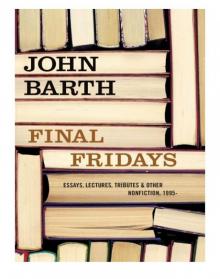 Final Fridays
Final Fridays Where Three Roads Meet: Novellas
Where Three Roads Meet: Novellas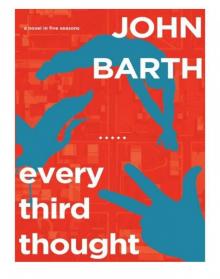 Every Third Thought: A Novel in Five Seasons
Every Third Thought: A Novel in Five Seasons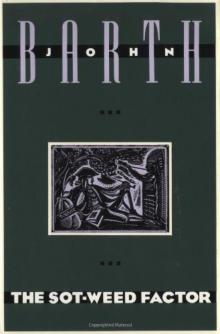 The Sot-Weed Factor
The Sot-Weed Factor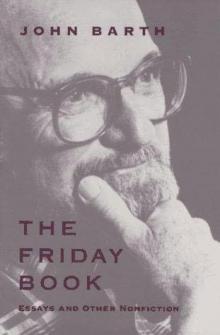 The Friday Book
The Friday Book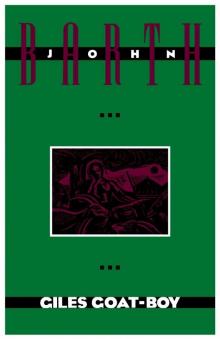 Giles Goat Boy
Giles Goat Boy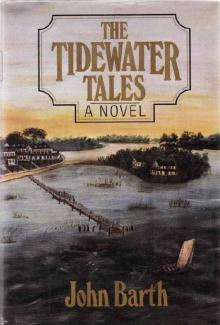 The Tidewater Tales
The Tidewater Tales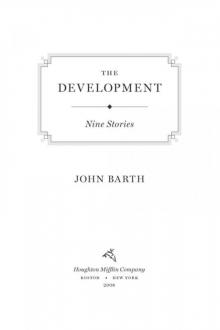 The Development
The Development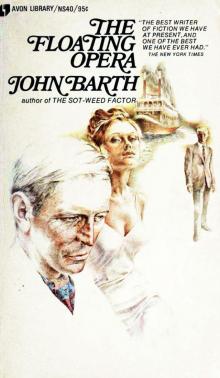 The Floating Opera
The Floating Opera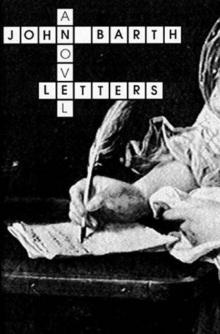 Letters
Letters Chimera
Chimera Where Three Roads Meet
Where Three Roads Meet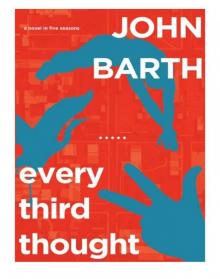 Every Third Thought
Every Third Thought